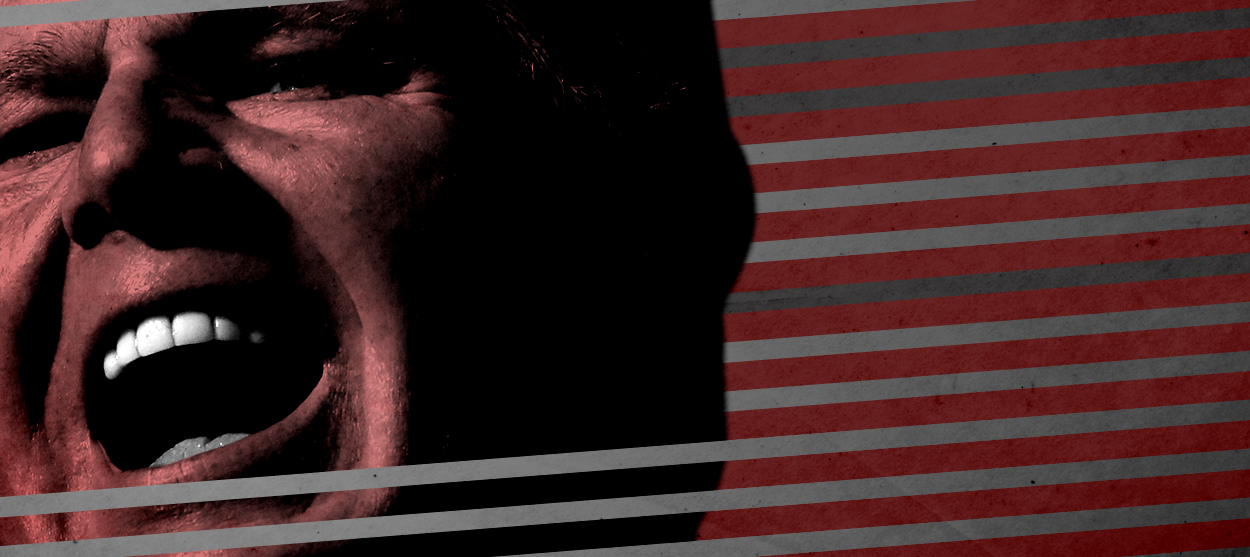Rush Limbaugh taught Republicans to rage
The pioneer of Donald Trump's grievance politics


A free daily email with the biggest news stories of the day – and the best features from TheWeek.com
You are now subscribed
Your newsletter sign-up was successful
It is said that we should not speak ill of the dead. But how should one remark on the life of a man who made hundreds of millions of dollars mocking and demeaning the dead and the dying?
On Wednesday, Rush Limbaugh, America's most famous radio personality and rabble rouser, died at the age of 70 from complications of lung cancer. For more than three decades on "The Rush Limbaugh Show," Limbaugh, now being gently hailed by even such places as The New York Times as the "voice of conservative America," used his airwaves to spew vitriol and hate, all the while pushing the Republican Party, with the help of Fox News, to the extreme right where it now simmers. His tirades, tantrums, and trolling, once unique, became standard operating procedure for an entire conservative media ecosystem that arose in the same years — and for a Republican Party that replaced its once-held belief in good governance with an oversized sense of white grievance as its driving impulse.
Almost daily, Limbaugh raged against immigrants, Muslims, LGBTQ persons, and especially, women. Those rants trafficked in standard xenophobia, racism, homophobia, and misogyny, drilling what should have been out-of-bounds ideas and language right into the center of his more than 15 million weekly listeners' heads and hearts. To the straight-up bigotry, Limbaugh added a thin layer of political commentary. What he was calling out, Limbaugh argued, was liberals' exaggerated "victimhood." "There isn't a non-conservative individual in this country, according to Democrats, who is not a victim…of this country," Limbaugh yelled during a 2012 show.
The Week
Escape your echo chamber. Get the facts behind the news, plus analysis from multiple perspectives.

Sign up for The Week's Free Newsletters
From our morning news briefing to a weekly Good News Newsletter, get the best of The Week delivered directly to your inbox.
From our morning news briefing to a weekly Good News Newsletter, get the best of The Week delivered directly to your inbox.
Of course, as much as Limbaugh wanted to root out any talk by minorities or women of historic injustices and real grievances from American life and politics, his show's most significant legacy may be in how he cultivated a sense of personal victimhood in his listeners, a group that was overwhelmingly white and male. Their outrage, stoked by Limbaugh's daily diatribes, remade an entire political party and drove it to the outrageous outcome of Donald Trump's rise to power.
Limbaugh's enraged anger that white, heterosexual males were the most embattled and persecuted American demographic pulsed through his show and animated his cruel attacks on others. Even from the perspective of today's degraded political culture that he helped bring about, Limbaugh's cruelty remains shocking.
As HIV/AIDS killed thousands of gay men in the 1990s, for example, Limbaugh regularly featured an "AIDS Update" segment on his shows where he gleefully read aloud the names of recently-deceased men while playing Dionne Warwick's "I'll Never Love This Way Again." He regularly mocked the mass extermination of Native Americans, one time wondering how many had died from the arrival of white men to North America versus from lung cancer because of smoking, perhaps, given his own eventual illness, the only insult he might have ever regretted. For the thousands who died from natural disasters around the world, including earthquakes or tsunamis in Haiti, Japan, and South Asia, Limbaugh unleashed a particular viciousness, often suggesting that death toll numbers had been inflated for political reasons — an ugly point that, in 2020, he directed stateside as COVID-19 ravaged the U.S. "We have to remember that people die every day in America, before the coronavirus came along," Limbaugh blithely told his audience last year.
Limbaugh's maliciousness towards the real suffering of others — he even scoffed in 2006 that Michael J. Fox exaggerated the symptoms of his Parkinson's disease — worked alongside his obsessive insistence that white, heterosexual men were being unfairly targeted, a view that dominated his show during Barack Obama's presidency but had been there since the start. Responding to the election of the nation's first African-American president with a steady stream of birtherism, conspiracy theories, and just plain racism, Limbaugh pushed white grievance to particularly dark places. "In Obama's America, the white kids now get beat up with the black kids cheering," Limbaugh said in 2009.
A free daily email with the biggest news stories of the day – and the best features from TheWeek.com
Having spent decades developing his white male audience's feelings of oppression and victimhood, Limbaugh paved the way for Trump's capturing of the GOP nomination. Trump lacked both a clear policy agenda and even a coherent political ideology. Yet those things didn't seem to matter with the Republican base by 2016.
Instead, Trump spoke the language of Limbaugh: crackpot theories, coarse insults, and, above everything else, white resentments and outrages. He had learned it all as a loyal listener of Limbaugh's show for years. On everything from the media to Obama's citizenship status to race, Trump parroted ideas that had been pushed by the radio host, just as millions of other "Dittoheads" around the country made Limbaugh's words their own. Perhaps that was never clearer than when Trump talked about immigration, which Limbaugh constantly characterized as an "invasion" on white America, even once referring to undocumented Mexican immigrants as an "invasive species." The bombastic blathering of an entertainer? Maybe. But millions of listeners took it all as deadly serious. None more than Trump himself.
Limbaugh's voice may now be gone. But the ugliness he injected into the nation is alive and well.
Neil J. Young is a historian and the author of We Gather Together: The Religious Right and the Problem of Interfaith Politics. He writes frequently on American politics, culture, and religion for publications including The New York Times, The Atlantic, the Los Angeles Times, HuffPost, Vox, and Politico. He co-hosts the history podcast Past Present.
-
 How the FCC’s ‘equal time’ rule works
How the FCC’s ‘equal time’ rule worksIn the Spotlight The law is at the heart of the Colbert-CBS conflict
-
 What is the endgame in the DHS shutdown?
What is the endgame in the DHS shutdown?Today’s Big Question Democrats want to rein in ICE’s immigration crackdown
-
 ‘Poor time management isn’t just an inconvenience’
‘Poor time management isn’t just an inconvenience’Instant Opinion Opinion, comment and editorials of the day
-
 The billionaires’ wealth tax: a catastrophe for California?
The billionaires’ wealth tax: a catastrophe for California?Talking Point Peter Thiel and Larry Page preparing to change state residency
-
 Bari Weiss’ ‘60 Minutes’ scandal is about more than one report
Bari Weiss’ ‘60 Minutes’ scandal is about more than one reportIN THE SPOTLIGHT By blocking an approved segment on a controversial prison holding US deportees in El Salvador, the editor-in-chief of CBS News has become the main story
-
 Has Zohran Mamdani shown the Democrats how to win again?
Has Zohran Mamdani shown the Democrats how to win again?Today’s Big Question New York City mayoral election touted as victory for left-wing populists but moderate centrist wins elsewhere present more complex path for Democratic Party
-
 Millions turn out for anti-Trump ‘No Kings’ rallies
Millions turn out for anti-Trump ‘No Kings’ ralliesSpeed Read An estimated 7 million people participated, 2 million more than at the first ‘No Kings’ protest in June
-
 Ghislaine Maxwell: angling for a Trump pardon
Ghislaine Maxwell: angling for a Trump pardonTalking Point Convicted sex trafficker's testimony could shed new light on president's links to Jeffrey Epstein
-
 The last words and final moments of 40 presidents
The last words and final moments of 40 presidentsThe Explainer Some are eloquent quotes worthy of the holders of the highest office in the nation, and others... aren't
-
 The JFK files: the truth at last?
The JFK files: the truth at last?In The Spotlight More than 64,000 previously classified documents relating the 1963 assassination of John F. Kennedy have been released by the Trump administration
-
 'Seriously, not literally': how should the world take Donald Trump?
'Seriously, not literally': how should the world take Donald Trump?Today's big question White House rhetoric and reality look likely to become increasingly blurred
